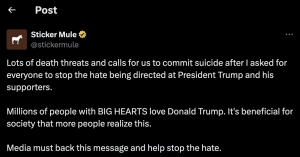Surprisingly though this might be, a recent study chillingly found that nearly a third of Americans believe political violence is justifiable under certain circumstances.
While most of us probably think of moments like the attempted assassination of former President Trump or Gabby Giffords back in 2011 as primary examples of such violence, the fact is that regular business executives with controversial or vocal presences on the internet can be just as aggressive.
And, this activity really can put their companies and employees at risk of attacks.
The dangers of controversy
Online adversarialism is at its peak and goes well beyond the big news stories that have been making headlines recently.
Unfortunately, public statements of any kind can become sources for hot social media conflicts that then devolve into internet stalking and individuals’ and company leaders’ information, business deals, and personal histories getting exposed online.
Journalists or even regular employees and executives have been threatened with doxxing or even targeted with death threats for something as simple as criticizing Taylor Swift or DJing for a controversial show at the Olympics.
Just this July, the co-founder of a popular sticker company called Sticker Mule was forced to award his employees a $2500 bonus in an attempt to offset the death threats they had received as a result of controversial statements the co-founder had made on social media (see below):



In certain cases, threats may even go beyond the digital world. It’s all too easy for malicious actors to look up an executive’s information on a data broker site and send threats right to the person’s doorstep.
Most of these threats are simply intended to inspire fear, but businesses are increasingly facing the risk that people could make good on those threats.
Reputational issues too
Generally speaking, most companies are far more concerned with the reputational and business risks of their executives potentially facing internet scrutiny or significant criticism, like in the recent case of David Sacks and Parker Conrad.
The two VCs became embroiled in a major internet controversy after one tweet resulted in a decades-old conflict resurfacing with a vengeance, and other voices across the internet soon decided to add their opinions and adversarialism into the mix.
Now, it’s a major news story in business publications.
Considering the current political tension in the US, a controversial social media statement might not even be necessary to catalyze an attack.
The motivation could be as simple as discovering from a publicly available website that a CEO is a member of a particular political party or supports a certain organization monetarily.
This exposed information coupled with the easy availability of previous internet and social activity, home addresses, phone numbers, and email addresses of potential victims, puts business owners and workers alike at serious risk.
Reducing the risk
There are two primary potential areas of concern when it comes to executives increasing the risk of threats or online criticism aimed at themselves or their companies.
The first is of course social media. However, the risks go beyond simply posting controversial statements.
There have been public figures attacked online for liking a particular post or following a political account.
This is among the reasons that caused X (formerly Twitter) to recently make likes private; Instagram, however, still allows users to see who liked a post.
Another action that could get social media users in trouble is sharing photos.
If, for example, your CEO shares a photo of an interaction with a public figure or of a visit to an organization that has taken a particular stance, that could also create an issue.
The role for HR
It’s probably a good idea for HR teams to ensure top employees and CEOs know to take particular care with what they post online, especially during an election year.
Better yet, train employees and company representatives on three main tactics to diffuse conflicts that do arise.
But how?
First, encourage workers and executives to always state that their personal opinions do not represent the company.
Second, encourage workers to disengage when things get heated.
Simply not responding can lead other social media users feeling ignored and increase frustration rather than diffusing it, so disengaging should involve saying something like, “I appreciate your input,” or the equivalent of “Let’s agree to disagree” and ending the conversation there.
Third, if a conversation has already gotten headed and is turning into a public relations nightmare, it may be time for HR to step in and recommend that the employee or executive involve issue an apology or a carefully worded retraction.
Beware digital footprints
One particular area of concern, however, which is often the hardest to deal with, is the overall digital footprint throughout the internet that many business executives aren’t even aware of.
Every website one visit collects a certain amount of information.
If someone has subscribed to mailing lists or interacted with websites that could be selling your information to third parties, it’s highly likely that your personally identifiable information (PII), including your phone number and home address and potentially your political leanings, is already publicly available on data broker sites.
There are a few ways organisations can protect themselves better going forward.
The first is to use a virtual private network (VPN), which creates a secure, encrypted connection between your device and a server operated by the VPN service.
A VPN hides browser activity from the websites someone visits, so those websites won’t be able to display targeted ads or sell your browsing information to third parties and data brokers.
Speaking of data brokers, HR should do a search to see where the CEO’s (or other board members’) information appears online and find out how to opt out of it.
Most data broker sites will entertain requests to have information removed, which means data is kept private.
This type of data removal is one of the best ways to make your CEO less visible and reduce risks of online threats that may turn into physical attacks.
Of course, none of these methods will reduce a company’s risk to zero.
But there are ways to keep yourself a little safer and help ensure the continuity of your organization, even during a time of increased polarization.
The world we live in
In an ideal world, people could express political views with a reasonable expectation of safety and wellbeing.
Unfortunately, the world we live in is less than ideal, which means that businesses must take appropriate measures to protect their top employees and executives from potential threats.
